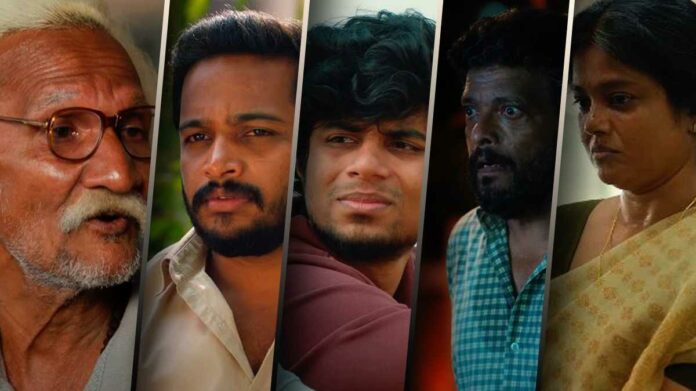Dysfunctional family stories have been a staple in Malayalam films. Many Malayalam filmmakers have a penchant for adding realism to this genre to make their stories relatable and believable. We’ve had Sathyan Anthikad drill out many family-oriented films, but the core of each of his films would be the disagreement and dysfunctionality of it. Sandesham is an excellent example of how a story laced with politics and dysfunctionality would produce an ever-green satire. Apart from this film from the early 1990s, lately, films like Joji and Appan have extensively covered the negative impact of an imbalanced family on its members. Falimy, written and directed by Nithish Sahadev, is about a family who are essentially tired of each other but end up taking a trip together.
Falimy begins with Anu, the dubbing artist, and his mother struggling with the responsibility of running their middle-class home. Anu’s father, Chandran, has a printing press that has remained inactive for many years and does not contribute anything to the family to help them sustain themselves. His younger brother, Abhi, is equally irresponsible but is hoping to get into a university in the UK. Amidst all the chaos, Chandran’s aging father has been caught leaving their home one too many times. He wishes to visit Kashi in Uttar Pradesh. His son and grandchildren are nowhere close to helping him fulfill his last dream before he passes away. A series of unfortunate events led to Anu deciding to take his grandfather on the much-awaited trip. The rest of the members reluctantly join them, and thus their journey begins, which could make or break this family. This forms the crux of the film, and there is a lot to discover about the family members.
The word ‘Falimy’ is a play on the word ‘family’ tweaked to reflect the dilapidated status of the people who are a part of this one. They are together because of their circumstances. Nithish Sahadev, as a writer and a director, along with Sanjo Joseph, was able to create the perfect atmosphere of a middle-class household. Every scene involving parents and children is relatable. Snapping and constant bickering are staples in a household that has every member of the family struggling to make ends meet. It is essential to show the mother struggling the most because she not only has to bring home the bacon but also runs the household 24/7 as a well-oiled machine. It was essential to show this because a mother always has to sacrifice a lot to make sure there is no friction in the family. They end up having to be mediators around egoistic men.
Nithish and Sanjo delicately added and executed these scenes without making much noise about them. A scene has Anu rather rudely letting his mother know she needs to get out of the house more often to get a hang of how the world functions. This throws light on how mothers are always neglected members, and many tend to just take them for granted. It was the mother who ended up acting smart when the family was on the brink of falling into trouble in a land away from their native speakers.
Nithish and Sanjo beautifully bring out the quarrels and the disagreement after several events and incidents slow down their journey. The film also captures the loneliness felt by the elderly members of a family, who suddenly feel stuck and are rendered frail and feeble. The grandparents are the most neglected members of the family, and after a point, no one asks what they want in life and they’re asked to stop dreaming of small wishes just because of their aging mind and body. The writers discuss the male ego on several occasions, and it allows us to understand how these aspects ruin many relationships for good. These are some of the highlights of Falimy, and none of them seem forced into the narrative. The screenplay allows all the facets to come out in the form of humor, which elevates the viewing experience.
Even though the story and the ending were predictable, the straightforward direction allowed the film to remain steady till the end. There were no unnecessary subplots or deviations from the actual story, which allowed the audience to remain hooked on the film. Nithish Sahadev’s direction is simple and effective. He does not go overboard with a steady screenplay, which is good for a story as simple and hearty as this one. The humor works at every juncture, and a lot could be taken away from this film about how to integrate comedy into a screenplay. Hilarious incidents happen naturally in the story, and the situational humor is another highlight.
The editing by Nidhin Raj Arol is tight, and the cinematography by Bablu Aju is excellent. Certain frames in the film will stay with you long after the movie is over. It is simple yet leaves a lasting impression. The casting of the actors and the performances stand out for all the right reasons. Basil Joseph, as Anu, is excellent as the egoistical son who might just be like his selfish father. Both have a hilarious redemption arc, and their performances in certain crucial scenes make the ending highly enjoyable.
Jagadish as Chandran, the father who does nothing for the family but still has pride that he stands by, is excellent. It is endearing to watch actors from yesteryear like him take on such character roles and explore complex characters. Meenaraj Palluruthy as the grandfather shines in crucial scenes, and there is a lot to take away from his life story in the film. Manju Pillai, the lone-standing woman, is brilliant as a person who essentially wants things to work as per her wish for the first time in years. Sandeep Pradeep should be credited for some great comic timing, and it lands in most of the scenes involving him. There is a lot that is shown in Falimy that uncovers the hilarious repercussions of a dysfunctional family.

